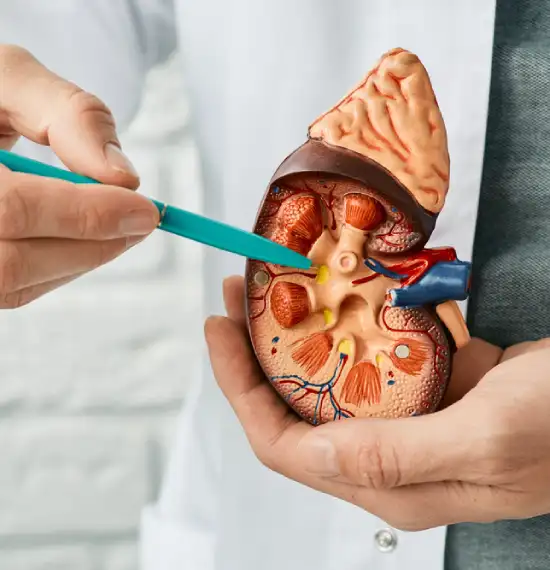Urology
Urology is a medical and surgical super-speciality that addresses various disorders of the urinary tract in both men and women, including the kidneys, urinary bladder, ureter (the tube through which urine passes from the kidney to the bladder) and urethra (the tube that throws urine out of the body).
State-of-the-Art
Facilities
Advanced Procedures
Competent and experienced team
Latest Equipments
Minimally invasive (key-hole)
route
State of the art lase
OUR DOCTORS
Meet Our Consultant's

Dr. Karthick KrishnamurthyMBBS, MS(Gen.surg), DNB, MRCS(Edin), MCh(Uro), FAIS
Urologist
Session : Morning

Dr Senthil kumar TMBBS, MS, DNB, MRCS(EDIN), MCH
Urologist
Session : Evening
Urological problems
treated in the Department
Both men and women can suffer from urinary incontinence.
It is a condition wherein the patient has difficulty in controlling the bladder and this may result in leakage of urine involuntarily.
While in some individuals the leakage is minor, in others there may hardly be any control of the bladder.
It can be an embarrassing situation to deal with and affect normal, day-to-day life. But, with the right remedial measures, this condition can be treated effectively.
These are a group of conditions that a person contracts from another through sexual contact or intimate physical contact.
STDs are passed on through different microorganisms such as bacteria, viruses, protozoa or yeast that cause infection in the genital area. STDs can affect both men and women.
Some of the most common STDs are — Human Papillomavirus (HPV), Syphilis, Gonorrhoea, Chlamydia, Genital Herpes and HIV/AIDS.
Often, the disease may not show any symptoms but if untreated can cause severe infection.
Common signs and symptoms of STDs include itching or redness in the genital area, abnormal vaginal discharge, genital warts, unusual discharge from the penis and burning sensation while urinating.
There are certain conditions that can affect the shape, size and function of the penis and testicles.
Such disorders can be painful and affect sexual function of the man, interfering with his ability to reproduce naturally.
Most of these conditions can be treated through surgery.
This is a type of urinary tract infection that affects the bladder.
Cystitis occurs when bacteria from outside the body travels to the bladder causing inflammation.
If untreated, this condition may spread to other organs such as the kidneys.
Most of the bladder infections are caused by E.coli bacteria that may be present in the intestines
The prostate is a gland that lies in the reproductive system of males and is responsible for producing seminal fluid (that carries sperm).
When cancer affects this gland it is called prostate cancer and is common among older men.
Early detection and treatment can ensure that the cancer is resolved and does not spread to other parts of the body.
Urinary Tract Infection (UTI) is an infection of the urinary system — it can affect the urethra, bladder, kidney or ureter.
In this condition, bacteria from outside the body enter the urinary tract and cause inflammation.
Some of the symptoms of UTI include pain or burning sensation while urinating; urge to urinate frequently, pain and discomfort in the lower abdomen and pelvic region, back pain and sometimes fever.
There are many reasons for the formation of bladder stones — high concentration of acid in the urine, urinary tract infection, blockage at the end of the bladder, prostrate problems are some of them.
Bladder stones can lead to difficulty in passing urine, painful urination, blood in the urine and abdominal pain
It is seen more frequently in older men and may be caused because of age-related hormonal changes in the body.
Some of the symptoms to recognise enlarged prostate are—difficulty or strain while urinating, urinary incontinence, blood in urine, not able to fully empty the bladder, painful urination among others.
When a man has a problem with his reproductive system, because of which he is not able to have children with his partner, it is termed as male infertility.
There are many causes because of which a male is not able to reproduce naturally, the most common being abnormalities of the sperm.
In some men, there may be hormonal or immunity issues because of which the sperm count is low. Other causes include erectile dysfunction and premature ejaculation.
There are diagnostic tests to check for male infertility and the condition can be effectively treated.
Signs that indicate you
should see a Urologist
Cancer Surgeries
Renal Transplantation
Blood while passing urine
Erectile dysfunction
Penectomy,Orchidectomy
PCNL,URS,OIU,TURP,TURBT
Fever and nausea
Reduced sex drive
Female Urology
Open and LAP Surgeries
Abnormalities in the penis or testicles
Signs that indicate you
should see a Urologist
Pain or discomfort while passing urine
Bladder does not get emptied fully
Blood while passing urine
Erectile dysfunction
Difficulty in maintaining bladder control
Frequent urination
Fever and nausea
Reduced sex drive
Pain in the groin or lower abdomen
Abnormalities in the penis or testicles
Our Special
Treatments
Cancer Surgeries
Open and LAP Surgeries
Endo Urological
Procedures
Nephrectomy, Pyeloplasty, Pyelolithotomy,Adrenalectomy
Penectomy,Orchidectomy
PCNL,URS,OIU,TURP,TURBT
Radial Nephrectomy,
Cysto Prostatectomy
Transobsturator Tabe (sling),
Colporrhaphy, Sacro Calpo Suspension
Female Urology
Renal Transplantation
Andrology Clinic, Neuro urology

Our Special
Treatments

About
Urology
Urology also deals with diseases of the male reproductive organs.
Urologists at the Hindu Mission Hospital have vast experience in timely and effective diagnosis and treatment of a range of medical conditions affecting these organs, through medications or surgery.
Our specialists are adept in dealing with kidney, ureter and bladder stones, urinary tract infections, abnormalities of the adrenal glands, prostate enlargement, stress urinary leak, male infertility and cancers of the kidney, prostrate and bladder.


